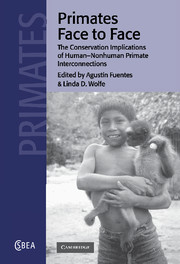Book contents
- Frontmatter
- Contents
- List of contributors
- Foreword
- Acknowledgements
- Introduction
- Part 1 Science and nonhuman primates
- Part 2 Cultural views of nonhuman primates
- 4 Monkey as food, monkey as child: Guajá symbolic cannibalism
- 5 Ethnoecology of monkeys among the Barí of Venezuela: perception, use and conservation
- 6 Primates in Matsigenka subsistence and world view
- 7 Monkey King in China: basis for a conservation policy?
- 8 Reflections on the concept of nature and gorillas in Rwanda: implications for conservation
- Part 3 Conservation of nonhuman primates
- Part 4 Government actions, local economies and nonhuman primates
- Index
8 - Reflections on the concept of nature and gorillas in Rwanda: implications for conservation
Published online by Cambridge University Press: 20 October 2009
- Frontmatter
- Contents
- List of contributors
- Foreword
- Acknowledgements
- Introduction
- Part 1 Science and nonhuman primates
- Part 2 Cultural views of nonhuman primates
- 4 Monkey as food, monkey as child: Guajá symbolic cannibalism
- 5 Ethnoecology of monkeys among the Barí of Venezuela: perception, use and conservation
- 6 Primates in Matsigenka subsistence and world view
- 7 Monkey King in China: basis for a conservation policy?
- 8 Reflections on the concept of nature and gorillas in Rwanda: implications for conservation
- Part 3 Conservation of nonhuman primates
- Part 4 Government actions, local economies and nonhuman primates
- Index
Summary
Introduction
The mountain gorilla (Gorilla gorilla beringei) of the Virunga region is endangered (Harcourt, 1996), and has been the focus of intense research and conservation efforts. Since 1959, work has been conducted on the socio-ecology of this ape, most of which is linked with the Karisoke Research Center (Robbins, Sicotte and Stewart, 2001). Even though conservationatists know more about mountain gorilla socio-ecology than 30 years ago, still relatively little is known about elements outside the forest that may ultimately affect the forest itself. For instance, research has looked at the people's attitude towards the forest, and at some of their practices influencing the forest (Weber, 1987, 1989; Plumptre and Williamson, 2001), but this socio-economic work around the Virunga is still in its infancy. The vision that people of Rwanda have of the forest and of wild spaces is also poorly documented. It seems, however, that it would be useful to better understand this relation to wild spaces, and more generally, the ‘cultural construction of nature’ in Rwanda to develop conservation programs better suited to the people of Rwanda.
This lack of understanding for the Rwandan cultural construction of nature provided the impetus for interviews, perfomed by P.S. in 1997–8, with 13 Bahutu living close to the Parc National des Volcans.
- Type
- Chapter
- Information
- Primates Face to FaceThe Conservation Implications of Human-nonhuman Primate Interconnections, pp. 163 - 182Publisher: Cambridge University PressPrint publication year: 2002
- 5
- Cited by



